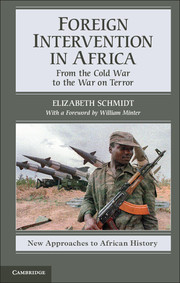Book contents
- Frontmatter
- Contents
- Illustrations
- Acknowledgments
- Foreword
- Abbreviations
- MAP 0.1. Africa, 1947. (Map by Philip Schwartzberg, Meridian Mapping, Minneapolis.)
- MAP 0.2. Africa, 2011. (Map by Philip Schwartzberg, Meridian Mapping, Minneapolis.)
- Introduction
- 1 Nationalism, Decolonization, and the Cold War, 1945–1991
- 2 Egypt and Algeria Radical Nationalism, Nonalignment, and External Intervention in North Africa, 1952–1973
- 3 The Congo Crisis, 1960–1965
- 4 War and Decolonization in Portugal's African Empire, 1961–1975
- 5 White-Minority Rule in Southern Africa, 1960–1990
- 6 Conflict in the Horn, 1952–1993
- 7 France's Private African Domain, 1947–1991
- 8 From the Cold War to the War on Terror, 1991–2010
- Conclusion
- Index
- References
3 - The Congo Crisis, 1960–1965
Published online by Cambridge University Press: 05 February 2013
- Frontmatter
- Contents
- Illustrations
- Acknowledgments
- Foreword
- Abbreviations
- MAP 0.1. Africa, 1947. (Map by Philip Schwartzberg, Meridian Mapping, Minneapolis.)
- MAP 0.2. Africa, 2011. (Map by Philip Schwartzberg, Meridian Mapping, Minneapolis.)
- Introduction
- 1 Nationalism, Decolonization, and the Cold War, 1945–1991
- 2 Egypt and Algeria Radical Nationalism, Nonalignment, and External Intervention in North Africa, 1952–1973
- 3 The Congo Crisis, 1960–1965
- 4 War and Decolonization in Portugal's African Empire, 1961–1975
- 5 White-Minority Rule in Southern Africa, 1960–1990
- 6 Conflict in the Horn, 1952–1993
- 7 France's Private African Domain, 1947–1991
- 8 From the Cold War to the War on Terror, 1991–2010
- Conclusion
- Index
- References
Summary
As the superpowers vied for influence in North Africa and the Middle East, the Belgian Congo became the next African battleground. Bordered by nine other territories in Central, Southern, and East Africa, the Congo was of fundamental political and economic concern to colonial and Cold War powers, the white-minority regimes of Southern Africa, and African and Asian countries in the UN. It was extremely rich in strategic minerals, containing some of the world's most significant deposits of copper, cobalt, and uranium (Katanga Province) and industrial diamonds (South Kasai Province), as well as important sources of tantalum, tin, and zinc. Belgium's most powerful financial group, Société Générale de Belgique, and its affiliates controlled approximately 70 percent of the Congolese national economy, including the Katanga mines, which were dominated by the Belgian-British joint venture Union Minière du Haut Katanga.
During the period 1960–65, the Congo was the target of significant intervention by external actors, some of it under UN auspices. Belgium, the former colonial power, and the United States, the preeminent Cold War player, had especially critical roles, while African nations contributed troops and material aid, primarily through the UN. Although the Soviet Union and Cuba were also involved, compared to that of the West, their role was marginal and their actions ineffective. Foreign commercial interests from Belgium, Britain, the United States, South Africa, and the Central African Federation were deeply embroiled in the conflict, largely in support of the secessionist movement in Katanga. Regional political interests also came into play as the white-ruled regimes of the Central African Federation and South Africa, along with Portugal as the dominant neighboring colonial power, attempted to contain the spread of radical nationalism by undermining the Congo's central government.
- Type
- Chapter
- Information
- Foreign Intervention in AfricaFrom the Cold War to the War on Terror, pp. 56 - 77Publisher: Cambridge University PressPrint publication year: 2013



